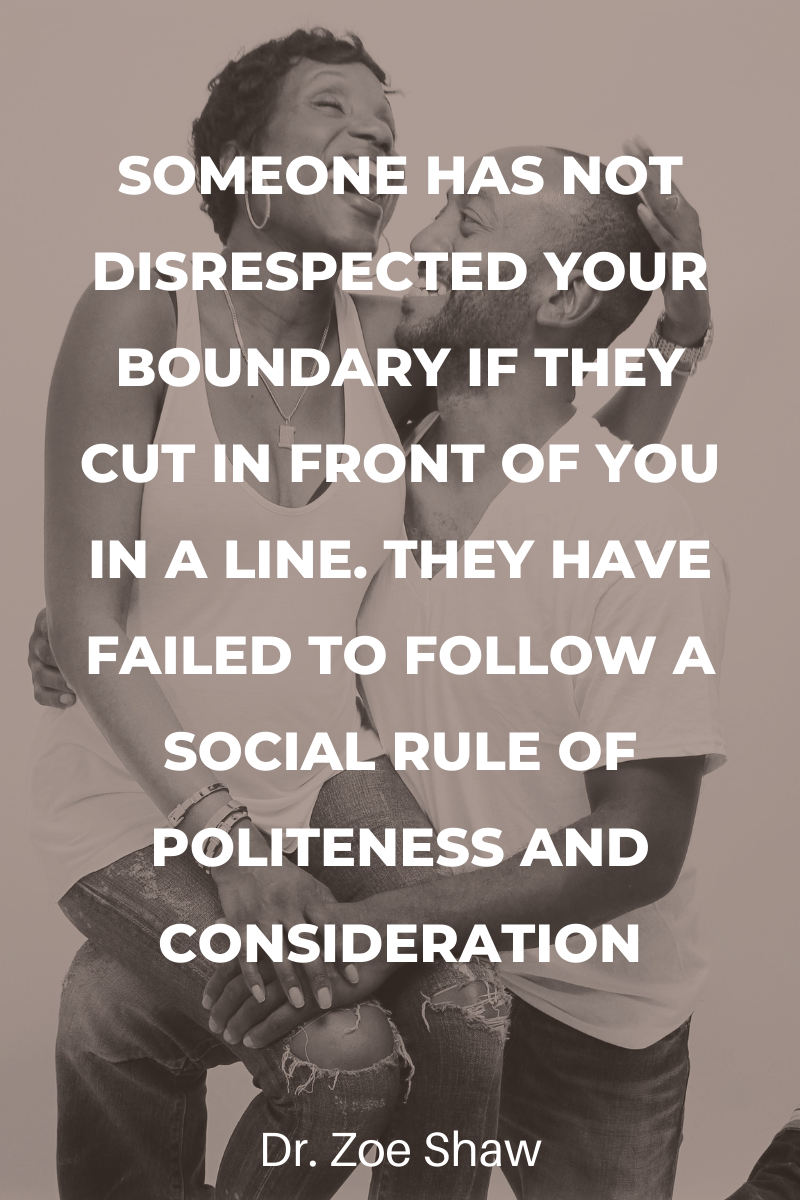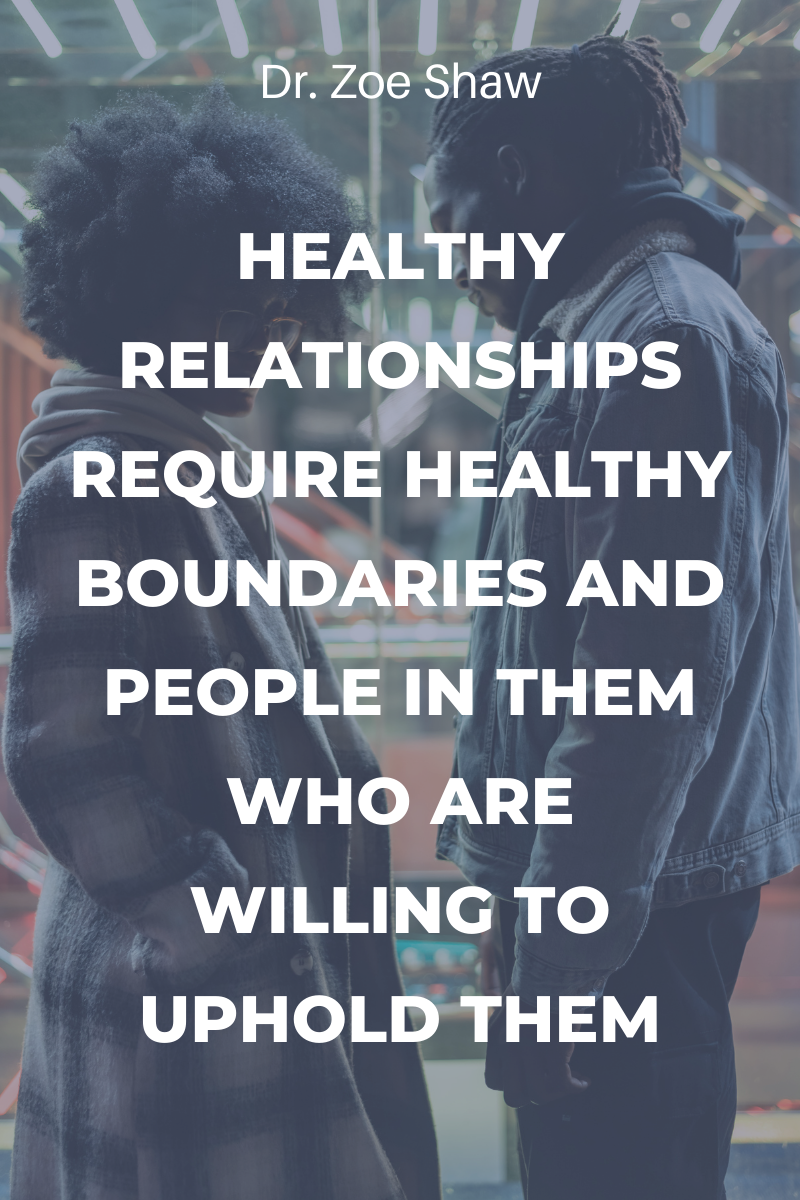I notice that some people who recognize the importance of boundaries seem to be missing the mark when it comes to erecting healthy ones.
I had a conversation with someone online that quickly took a wrong turn. Her response to me was, “you just crossed my boundary,” because I asked a pointed (albeit possibly rhetorical) question about the message she was sending to her children.
She was very upset and requested that I apologize to her. I admit that I became defensive immediately. I recognized this and then challenged myself on my defensiveness, wanting to not be someone who would disrespect someone’s boundaries.
As I mulled over whether I should apologize or not, I realized, wait- I’m getting caught up in group think- which is a sociological phenomenon that happens when emotions are high and everyone starts to buy into a fallacy when they otherwise would not.
This woman had a clear boundary. She may have had that boundary for decades or maybe just a minute. I had no reason to have any idea what her boundaries were. The fact that I crossed them angered her, but was that anger valid?
I firmly believe that all feelings are valid and we should honor them, but part of honoring them is understanding ourselves well enough to discern whether our feelings are directed in the right place. Her feeling of anger and indignation were valid given her unique makeup and life experiences, but I’m not sure they were properly directed.
I ultimately apologized for hurting her feelings, but the apology wrung hollow for me. I felt that it did for her as well, because I was not sorry for what I said. I was sorry that the conversation had gone so sideways and that her feelings were hurt.
I have since heard a number of people, clients and acquaintances, mention their boundaries and reference how someone crossed them.
A number of people have asked me..how they can create boundaries in certain relationships?
In close relationships, we should communicate what our boundaries are, but our boundaries are ours alone – not someone else’s. We don’t even need to disclose our boundaries to people we aren’t in a relationship with.
 Someone has not disrespected your boundary if they cut in front of you in a line. They have failed to follow a social rule of politeness and consideration. You don’t need to alert someone that they crossed your boundary in this instance. You can confront them, or just make a mental note.
Someone has not disrespected your boundary if they cut in front of you in a line. They have failed to follow a social rule of politeness and consideration. You don’t need to alert someone that they crossed your boundary in this instance. You can confront them, or just make a mental note.
People often ask me: how do I get people to respect my boundaries?
You don’t.
You can’t expect them to know what they are or to even fully understand them when you disclose them. Your boundary is yours and you teach people how to treat you by how you respond if a boundary is crossed.
If someone crosses your boundary, you can view it as information being given to you. You are learning about that person and which boundaries you may have to implement with them. It doesn’t have to even be a point of contention or disappointment on your part. Not yet. A boundary crossed means that you should take action if you want to remain in a healthy relationship with this person.
The action looks like you saying, “I’m not okay with that, or that won’t work for me.” If someone continues to cross the boundary even after you’ve made it clear that you are not okay with that, then you need to remove yourself from the engagement or situation.
If you respond in that way, consistently, their behavior will extinguish. Humans continue a behavior because it reaps them a benefit. If every time someone attempts to cross your boundary, they get shut down, they will stop. That’s how we teach people to treat us.
If they still choose to disrespect your boundaries, continually after being warned, despite your firm efforts to hold your boundary, then you need to decide what proximity you want this person to have in your life.
The problem is that many people never bother to speak up. They become angry and resentful instead, maybe even passive-aggressive. Some people will speak up and say the words, “I don’t like that,” but there is no follow through- or even worse, there is inconsistent follow through. Our behavior teaches them that they can usually get away with it and it’s worth your occasional anger and retaliation if most of the time, they can get away with it.

Some people will take another step and choose to end relationships the second a boundary is crossed. This may look like firm boundaries, but it is actually a result of not having firm boundaries. Ending relationships is actually a way to avoid holding firm boundaries. Healthy relationships require healthy boundaries and people in them who are willing to uphold them. So, I wouldn’t go so far as to end a relationship immediately. Make your boundary clear first and then sit back and watch.
Few people erect healthy boundaries, maintain them consistently and teach people how to treat us in a healthy way.
There are some social norms that people blatantly disrespect, like cutting in front of you in line or calling you a name. That’s not boundary-crossing. That’s just bad behavior. Your anger is a natural response to that.
A boundary is more personal. It’s something that may not necessarily be a social norm, but it’s important for you and your mental and emotional health in a relationship. You and those in it, should honor it.
How did you uphold your boundary today?
Share this Post

